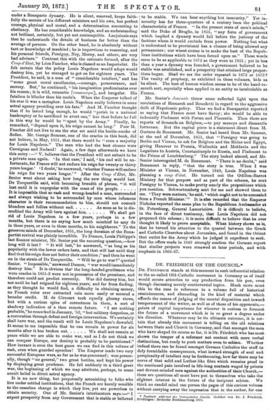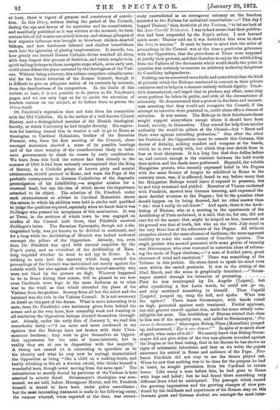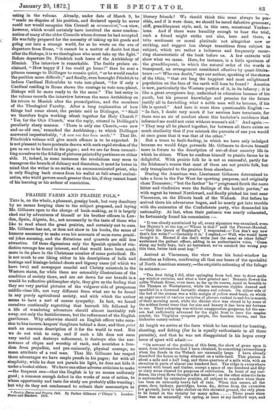DR. FRIEDRICH ON THE COUNCIL*
DR. FRIEDRICII stands at this moment in such influential relation to the so-called Old-Catholic movement in Germany as of itself would secure attention to any production from his pen, even though discussing merely controversial topics. Much more must this be the case in reference to a volume full of historical reminiscences, and abounding in the kind of material which affords the means of judging of the mental disposition and inward temperament of the writer, as well as of those of his opponents,— points of capital importance for whoever is curious to forecast the future of a movement which is in so great a degree under his direction. Whatever may be its ultimate outcome, it is cer- tain that already this movement is telling on the old relations between State and Church in Germany, and that amongst the men who have shaped its course so far, it is Dr. Friedrich who has most shown the temper of a reformer not content with mere verbal distinctions, but ready to push matters even to schism. Whether indeed there can be found amongst German Catholics the stuff to defy formidable consequences, what inward strength of soul and perspicacity of intellect may be forthcoming, how far there may be nerve of that solid and Luther-like fibre which remains proof to the continued pain involved in life-long contests waged by priests and devout-minded men against the authorities of their Church,— these are questions all must have put to themselves who take the slightest interest in the future of the incipient schism. We think no candid mind can peruse the pages of this carious volume without carrying away the impression that in the author, for 0110 Tagebuch tallirend do Vaticantschen Comas. DefUhrt von Dr. J. Friedrich. NUrddingen: Deckeche Buchhandiung, 1871.
at least, there is vigour of purpose and consistency of convic- tion. In this Diary, written during the period of the Council, during the ups and downs of its mysteries and its consultations, and manifestly published as it was written at the moment, we have curious bits of (of course one-sided) history, and strange glimpses of how superior influence was brought to browbeat chicken-hearted bishops, and how feebleness faltered and shallow boastfulness sank into the ignominy of glaring tergiversation. It records, too, how grimly one learned Roman Catholic divine watched all along with deep despair this process of detrition, and vainly sought to in- spirit halting bishops to those energetic steps which, as he early saw, could alone defeat the plans matured by the theologians of the Vati- can. Without being a history, this volume comprises valuable mate- rial for the future historian of the Roman Council, though it is difficult to give an adequate notion of its contents by extracts, from the desultoriness of its composition. In the limits of this review, at least, it is not possible to do justice to Dr. Friedrich's pages, and we can only hope so far to excite the attention of readers curious on the subject, as to induce them to peruse the Diary itself.
Dr. Friedrich's reputation does not date from his connection with the Old Catholics. He is the author of a well-known Church History, and a distinguished member of the Munich theological faculty, at which University he had taught divinity. His reputa- tion for learning caused him to receive a call to go to Rome as theologian to Cardinal Hohenlohe, brother of the Bavarian Premier, who, from the first mooting of the Council, alone amongst statesmen showed a sense of its possible bearings and of the most weighty of the considerations likely to influ- ence governments to check its course by early combination. We learn from this book the carious fact that already in the summer of 1869 it had been seriously contemplated that the King of Saxony, as a Catholic prince of known piety and mental attainments, should proceed to Rome, and warn the Pope of the probable consequences to German Catholicism of the dogmatic promulgation of his Infallibility,—a singular mission for a crowned head, but one the idea of which shows the importance attached to its object. The selection of Dr. Friedrich under such circumstances as adviser to Cardinal Ilohenlohe shows the esteem in which his abilities were held in circles well qualified to judge the qualities required, especially when we know that it was Dollinger who pressed his acceptance of this nomination. It was at Trent, in the archives of which town he was engaged on studies of the Council held there, that Friedrich received Dfillinger's letter. The Bavarian Episcopate, though not a dis- tinguished body, was yet known to be divided in sentiment, and for a long while the Archbishop of Munich was indeed reckoned amongst the pillars of the Opposition. Already, too, even then Dr. Friedrich was eyed with natural suspicion by the Pope's party, and an attendant of the Archbishop of Bam- berg inquired whether he went to act spy in Rome. It is striking to note how the mystery which hung around the proceedings of the Council was maintained not merely against the -outside world, but also against all within the sacred assembly who were not liked by the powers on high. Whoever happened to be in Rome during that season, will be pleased to see how even Cardinals were kept in the same darkness as to what was in the wind, as that which shrouded the plans of the Vatican from the profane. Secrecy from all but the select and the initiated was the rule in the Vatican Council. It is not necessary to dwell on this part of the drama. What is more interesting is to note, from Dr. Friedrich's own testimony given from behind the scenes and at the very hour, how miserably weak and wanting in all resolution the Opposition bishops showed themselves through- out. Already, under the early date of January 2, we read this remarkable entry :—" I am more and more confirmed in my -opinion that the Bishops have not broken with their Ultra- snontane brethren ; they wish to give themselves an Opposi- tion appearance for the sake of home-interests, but in teality they are at one in disposition with the majority." A bishop not named (it is interesting to speculate as to his identity and what he may now be saying) characterized the Opposition as being "like a child on a rocking-horse, and lustily whisking in the air a wooden sword, who thinks himself a wonderful hero, though never moving from the same spot." The intimidation so stoutly denied by partizans of the Vatican is here asserted in minute detail. Strossmayer's theologian was aim- monad, we are told, before Monsignore Marini, and Dr. Friedrich himself is stated to have been under police surveillance ; but the most interesting statement is made in the following entry, the rumour whereof, when reported at the time, was strenu-
ously contradicted as an outrageous calumny on the freedom accorded to the Fathers for unlimited consultation :—" This day I begged Theiner," then Archivist of the Vatican, "to let me look at the Ada Conciiii Tridentini. I was indeed aware that their publica- tion had been suspended by the Pope's orders. I now learned much more : Theiner told me it was forbidden him even to show the Ada to anyone." It must be borne in mind that the order of proceedings in the Council was at the time a particular grievance with the Opposition, that the precedents at Trent were supposed to justify their protests, and that therefore to enjoin the withholding from the Fathers of the documents which would decide the point in question was certainly to exercise an arbitrary authority dangerous to Conciliary independence.
Nothing can be conceived more futile and more trival than the kind of protests which the Bishops continued to concoct in their private conclaves and to lodge in a manner entirely without dignity. Fried- rich remonstrated, and urged that to produce any effect, some step must perforce be taken in public, and with all the circumstance of solemnity. He demonstrated that a protest in due form and earnest- ness asserting that they would not recognize the Council, if the attempt to terrorize were persisted in, could alone offer a chance of salvation. It was useless. The Bishops in their faintheartedness sought support everywhere except where it should have been found, namely, in themselves. They craved for help from secular authority the would-be pillars of the Church—but " Beust and Darn were against extending protection." One after the other the Prelates of the Opposition came to consult this German, this doctor of divinity, seeking comfort and weapons at his hands, which he is ever ready with, but which they ever shrink from in fear at their sharpness. It is a long line that thus defiles before us, and =dons enough is the contrast between the bold words then spoken and the deeds since performed. Haynald, the voluble Hungarian prelate, who recently expressed belief in the Dogma with the same fluency of tongue he exhibited in Rome in the contrary sense, was, it is affirmed, heard to say before many that the Hungarian Bishops would leave if exposed to pressure, but he and they remained and yielded. Ranscher of Vienna conferred with Friedrich, showed true German learning, and expressed the most decided aversion to the Dogma ; but to the question what should happen on its being decreed, had no other answer than " Ah ! that I really do not know." And again, there is the Arch- bishop of Rheims, who at a meeting in the apartments of the Archbishop of Paris exclaimed, it is said, that he, for one, did not care for all the names that might be heaped on him, inasmuch as his ground was that of truth, but who on the 18th July stood in the very front line of the adherents of the Dogma. All without exception showed the same absence of backbone, the same apparent inability to resist the main current of Conciliar opinion. The single prelate who seemed possessed with some grains of tenacity was Strossmayer, who even ventured to entertain ideas of reform- ing the mode of Papal elections,—" a man of decided parts, great clearness of mind and resolution." There was something of the Tribune in this prelate. He alone dared to speak his mind even once within the sacred precincts. It was in the sitting of the 22nd March, and the scene is graphically described :—" Strom- mayer carried through his intention of protesting. . First he was interrupted by De Angelis [Legate], but after ejaculating a few Latin words, he could not go on,
and only muttered something to himself. Then Capalti [Legate] jumped up, rang the bell, and spoke. What was the upshot? Three times Strossmayer, with hands raised on high, protested against such treatment. Partial applause, but still greater tumult against him, made the scene utterly unin- telligible for most. The Archbishop of Rheims related that close to him one of the majority rose, and called to Strossmayer, 'Nor dunes te damnamus I' whereupon Bishop Place (Marseilles) jumped up, and screamed, ' Ego te non damno!" In spite of so much show of spirit, what came of it all ? We merely know that Bishop Stross- mayer did not give either of the two non-placets recorded against the Dogma at the final voting, that in his diocese he has shown no signs of schismatic intentions, and that as we write the papers announce his arrival in Rome and audience of the Pope. Pro- fessor Friedrich did not stay to see the drama played out. When he saw that nothing was to be done for the purpose he had at heart, he sought permission from his Cardinal to return home. Like many a man before him, he had gone to Rome with hope and belief ; but he had found there something very different from what he anticipated. The passages which record the growing impressions and the growing changes of view pro- duced by the incidents and experiences of his Roman stay on this German guest and German student are amongst the most inter- eating in the volume. Already, under date of March 9, he "made no disguise of his position, and declared openly he never could nor would recognize this Council as cecumenical.,"—a view, however, which would certainly have involved the same condem- nation of many of the older Councils whose decrees he had accepted. He was fully prepared for the necessity of taking up his goods and going out into a strange world, for as he wrote on the eve of departure from Rome, "it cannot be a matter of doubt but that after the Bishops, it is we theologians who must take up the fight." Before departure Dr. Friedrich took leave of the Archbishop of Munich. The interview is remarkable. The feeble prelate ex- claimed, "flow happy if I too could go home l" then he sent a piteous message to Dollinger to remain quiet, "or he would render the position more difficult ;" and finally, even besought Friedrich to induce Cardinal Hohenlohe to vote non-placet, "for if only a Cardinal residing in Rome shows the courage to vote non-placet, Bishops will be more ready to do the same." The last entry in the volume records the interview between the same Archbishop on his return to Munich after the promulgation, and the members of the Theological Faculty. After a long explanation of how things had come about, the prelate said to Dollinger, " ' Shall we therefore begin working afresh together for Holy Church ?' 'Yes, for the OLD Church,' was the reply, uttered in Dollinger's peculiarly sharp manner. 'There is only one Church,—no new and no old one,' remarked the Archbishop ; to which Diillinger answered imperturbably, A new one has been made.'" That Dr. Friedrich's volume will give much offence is to be expected. It is not pleasant to have portraits drawn with such rapid strokes of the pen as are to be found in his pages ; and we are far from commit- ting ourselves to the fidelity of pictures painted by partizans on either side. If, indeed, in some instances the revelations may seem to transgress the bounds of delicacy and discretion, it must be borne in mind that the writer is an outlaw, an excommunicated priest, who is only flinging back stones from his wallet at full-armed ecclesi- astics, who wield powers much greater than his, if they cannot boast of his learning or his ardour of conviction.




































 Previous page
Previous page